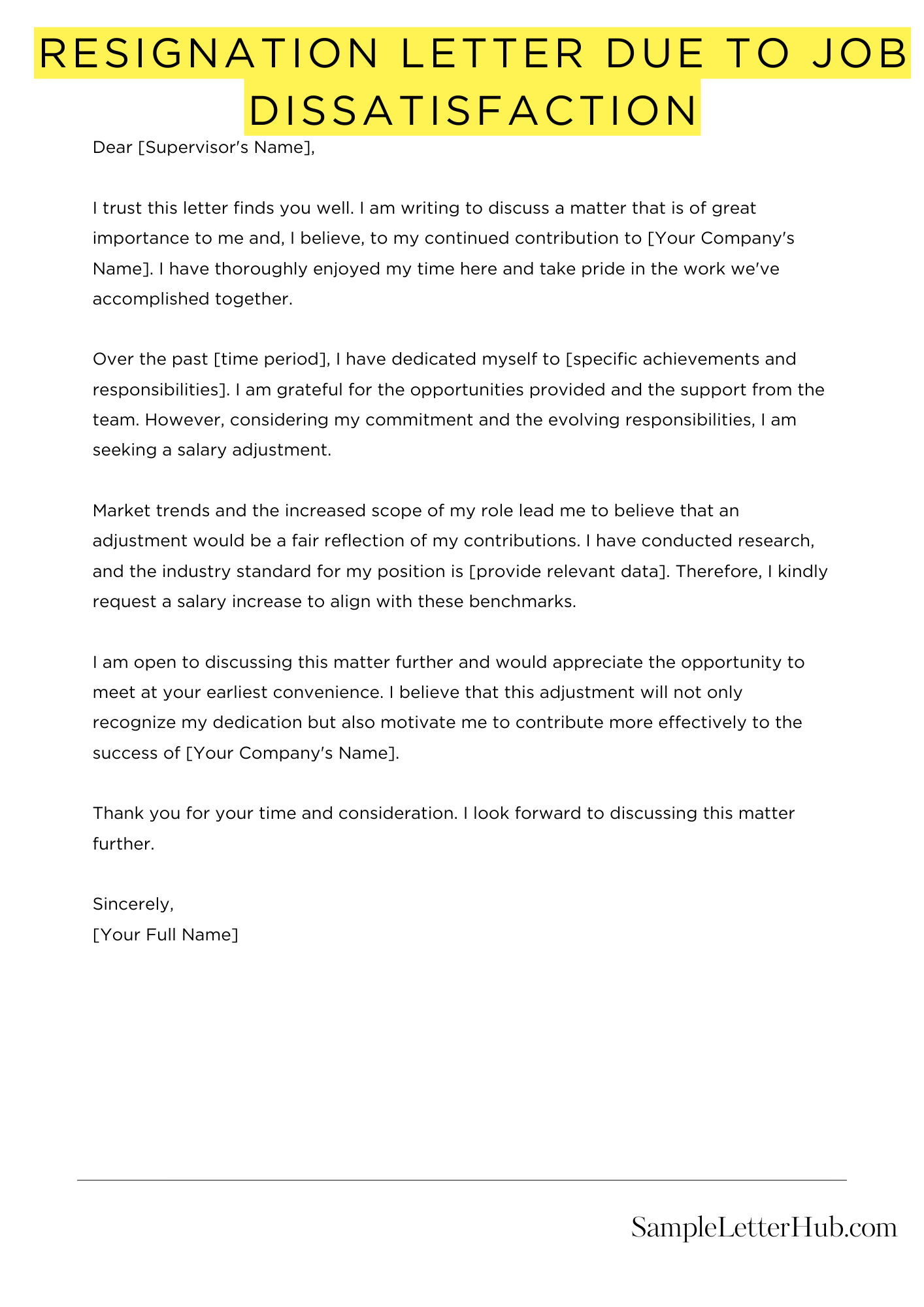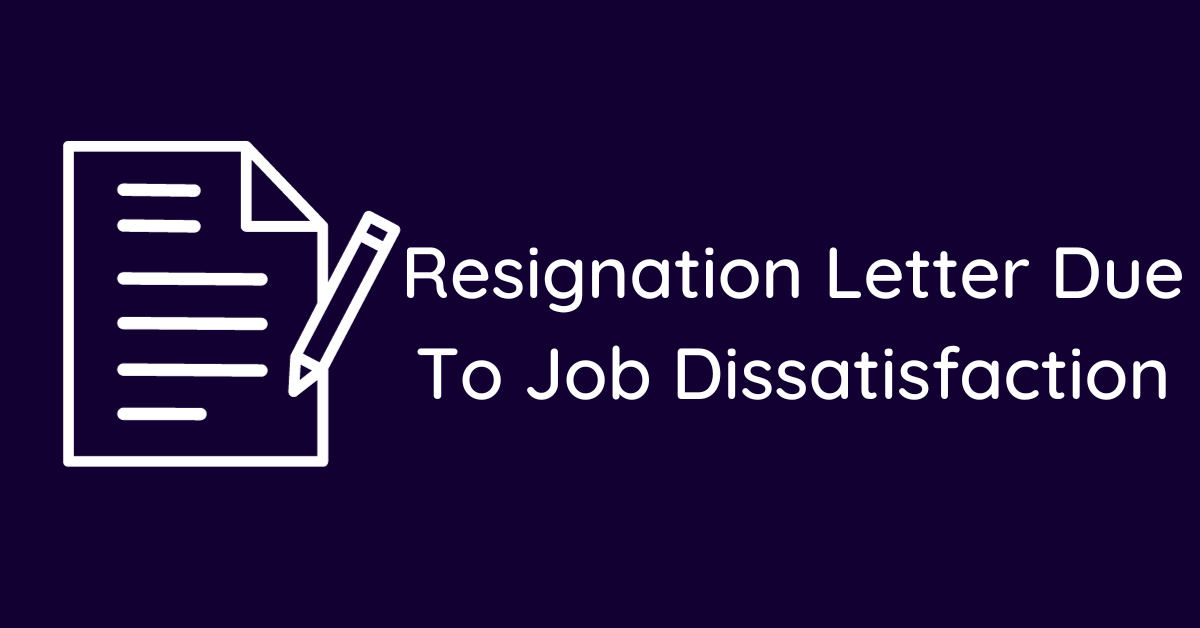Are you feeling unhappy and dissatisfied with your current job? Do you feel like it’s time to move on and find something better? If so, you may need to write a resignation letter due to job dissatisfaction.
This type of letter is used to formally notify your employer that you are resigning from your position because you are not satisfied with your job. The purpose of this letter is to provide a clear and concise explanation for your resignation, while also maintaining a professional tone.
In this blog article, we will provide you with templates, examples, and samples of resignation letters due to job dissatisfaction. We understand that writing a resignation letter can be a daunting task, especially if you are not sure what to say or how to say it.
That’s why we have created this resource to help make the process easier for you. Our goal is to provide you with a variety of options that you can use as a starting point for your own letter.
Whether you are resigning due to a toxic work environment, lack of growth opportunities, or simply because you are unhappy with your job, we have a variety of resignation letter templates that can help you express your thoughts and feelings in a professional manner.
Our samples are designed to be easy to use and customize, so you can create a letter that accurately reflects your situation and reasons for resigning.
Resignation Letter Due To Job Dissatisfaction
Dear [Recipient’s Name],
I hope this letter finds you well. After careful consideration, I am writing to tender my resignation from my position as [Your Position] at [Company Name], effective [Last Working Day, typically two weeks from the date of the letter].
While I have appreciated the opportunities and experiences gained during my time at [Company Name], it is with regret that I express my dissatisfaction with certain aspects of my role. Despite my best efforts and attempts to address concerns, it has become clear that these challenges are affecting my professional satisfaction and growth.
I believe this decision is in the best interest of both parties, allowing me to seek new opportunities that align more closely with my career goals and values. I am committed to completing any outstanding tasks and facilitating a smooth transition during the notice period.
I want to express my gratitude for the support and opportunities provided by [Company Name]. I have learned valuable skills and contributed to the team to the best of my abilities.
Thank you for your understanding. I wish [Company Name] continued success, and I hope our paths may cross again in the future.
Sincerely,
[Your Name]
Resignation Letter Expressing Disappointment
Dear [Recipient’s Name],
I am writing to officially resign from my position as [Your Position] at [Company Name], effective [Last Working Day, typically two weeks from the date of the letter].
It is with a heavy heart that I make this decision. Over the course of my tenure, I had hoped for a more positive and fulfilling work experience. Unfortunately, the challenges and disappointments I’ve faced during my time at [Company Name] have led me to this difficult decision.
I want to express my gratitude for the opportunities and experiences I’ve gained while working here. However, certain aspects of the work environment and organizational culture have left me disheartened and discouraged.
During the notice period, I am committed to completing any outstanding tasks and ensuring a smooth transition. I believe this decision is in the best interest of both parties, and I hope that the company can address these concerns for the benefit of future employees.
Thank you for the opportunities and the learning experiences provided during my time at [Company Name]. I wish the company success in its future endeavors.
Sincerely,
[Your Name]
Resignation Letter Due To Unsatisfactory Work Circumstances
Dear [Recipient’s Name],
I am writing to formally resign from my position as [Your Position] at [Company Name], effective [Last Working Day, typically two weeks from the date of the letter].
This decision comes after careful consideration of the work circumstances I have experienced during my time at [Company Name]. Unfortunately, the conditions have been consistently unsatisfactory, and despite my efforts, they have not improved.
I have attempted to address these concerns through various channels, but it seems that the necessary changes are not feasible. As a result, I believe it is in my best interest to seek new opportunities where I can contribute effectively and work in a more conducive environment.
During the notice period, I am committed to completing any pending tasks and assisting in the transition process. I appreciate the opportunities for professional growth and the experiences gained at [Company Name].
Thank you for your understanding. I wish [Company Name] continued success in the future.
Sincerely,
[Your Name]
Resignation Letter Unhappy With Management
Dear [Recipient’s Name],
I hope this letter finds you well. It is with a mix of emotions that I write to inform you of my decision to resign from my position as [Your Position] at [Company Name]. My last day of work will be [Last Working Day, typically two weeks from the date of the letter].
Over the course of my tenure at [Company Name], I have appreciated the opportunities for professional growth and the experiences gained. However, it is with regret that I express my dissatisfaction with the management approach within the organization.
Despite my efforts to adapt, I find that the current management style does not align with my professional values and work expectations. This misalignment has created challenges for me in performing at my best capacity and has contributed to a decline in my job satisfaction.
I believe that a harmonious working relationship between employees and management is crucial for both personal and organizational success. As I seek new opportunities, I hope to find an environment that fosters open communication, collaboration, and a positive work culture.
During the notice period, I am committed to completing any pending tasks and assisting in the transition process. I appreciate the experiences gained at [Company Name] and wish the organization continued success in the future.
Thank you for your understanding.
Sincerely,
[Your Name]
Resignation Letter Due To Unfair Treatment
Dear [Recipient’s Name],
I trust this letter finds you in good health. I am writing to formally resign from my position as [Your Position] at [Company Name], effective [Last Working Day, typically two weeks from the date of the letter].
It is with a heavy heart that I take this decision, as I have experienced a pattern of unfair treatment during my time with the company. Despite my dedication and hard work, I feel that my contributions have not been recognized, and I have encountered situations that compromise the principles of fairness and equity.
As an employee, I believe in a work environment that upholds values of equality, respect, and professionalism. Unfortunately, the circumstances I have faced have made it challenging for me to continue working with the same level of commitment and enthusiasm.
During my notice period, I am committed to completing any pending tasks and facilitating a smooth transition. I appreciate the opportunities for growth and learning that I have gained at [Company Name] and wish the organization continued success in the future.
Thank you for your understanding.
Sincerely,
[Your Name]

How to Write a Resignation Letter Due to Job Dissatisfaction
If you’re feeling unhappy or dissatisfied with your job, it may be time to consider resigning. Writing a resignation letter can be a daunting task, but it’s important to do it right. Here are some tips on how to write a resignation letter due to job dissatisfaction.
1. Be Clear and Concise
Your resignation letter should be clear and concise. Start by stating your intention to resign and the date of your last day of work. Be sure to thank your employer for the opportunities you’ve had while working there.
2. Explain Your Reasons
It’s important to explain your reasons for resigning, especially if it’s due to job dissatisfaction. Be honest but professional in your explanation. Avoid being negative or critical of your employer or colleagues.
3. Offer Constructive Feedback
If you feel comfortable doing so, offer constructive feedback on how your employer could improve the work environment. This can be helpful for both you and your employer, as it may prevent similar issues from arising in the future.
4. Keep it Professional
Your resignation letter should be professional in tone and content. Avoid using emotional language or making personal attacks. Remember that this letter will be part of your employment record, so it’s important to maintain a positive and professional image.
5. Provide Contact Information
Be sure to provide your contact information in your resignation letter. This includes your phone number and email address. This will make it easier for your employer to contact you if they have any questions or need to follow up with you.
6. Offer to Help with the Transition
If possible, offer to help with the transition process. This can include training your replacement or completing any outstanding projects. This will show your employer that you’re committed to ensuring a smooth transition and leaving on good terms.
7. Proofread and Edit
Before sending your resignation letter, be sure to proofread and edit it carefully. Check for spelling and grammar errors, and make sure the tone and content are appropriate. This will ensure that your letter is professional and effective.
FAQs About Resignation Letter Due to Job Dissatisfaction
1. What should I include in my resignation letter due to job dissatisfaction?
In your resignation letter, you should clearly state your reasons for leaving and express your gratitude for the opportunities you had while working for the company. It is important to maintain a professional tone and avoid any negative comments or criticism.
2. Should I discuss my dissatisfaction with my employer before submitting my resignation letter?
It is always a good idea to discuss your concerns with your employer before making any decisions. This can give them an opportunity to address your concerns and potentially resolve any issues. However, if you have already made up your mind to leave, it is not necessary to have this conversation.
3. How much notice should I give before resigning?
The amount of notice you should give depends on your employment contract and company policy. Generally, two weeks’ notice is standard, but some companies may require more or less notice.
4. Can I resign immediately if I am extremely unhappy with my job?
While it is possible to resign immediately, it is not recommended. This can leave your employer in a difficult position and may harm your professional reputation. It is best to provide notice and work with your employer to ensure a smooth transition.
5. Should I provide feedback on the company culture or management in my resignation letter?
It is not necessary to provide feedback on the company culture or management in your resignation letter. If you feel strongly about these issues, it may be more appropriate to discuss them with HR or management before leaving.
6. How can I ensure a positive reference from my employer after resigning due to job dissatisfaction?
Maintain a professional attitude throughout the resignation process and provide ample notice. It is also important to express your gratitude for the opportunities you had while working for the company. If possible, try to leave on good terms and maintain a positive relationship with your employer.
7. What should I do after submitting my resignation letter?
After submitting your resignation letter, it is important to tie up any loose ends and ensure a smooth transition for your employer. You should also begin searching for new job opportunities and preparing for your next career move.
Related:

